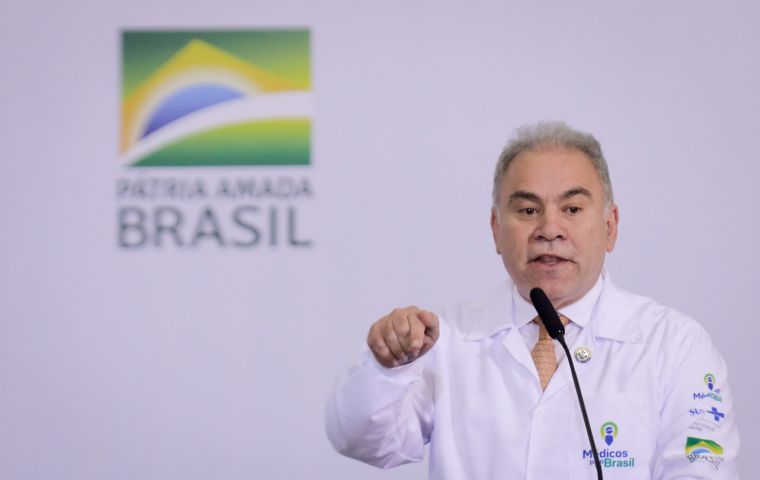MercoPress. South Atlantic News Agency
Brazil's Health Minister officially announces end of covid-19 emergency
 Queiroga's measure will become effective after a 30-day transition period
Queiroga's measure will become effective after a 30-day transition period Brazil's Health Minister Marcelo Queiroga Friday signed the declaration officially marking the end of the COVID-19 public emergency of national interest, which had recognized the severity of the pandemic and allowed authorities of all jurisdictions to act accordingly.
Queiroga's new measure becomes effective May 22, which gives those affected a 30-day window to transition to the new state of things. The minister also explained that this change will not compromise the various actions and allocation of resources currently underway.
“Even if we have cases of COVID-19, because the virus will continue to circulate, if there is a need for care in primary care and ICU beds, we can meet it,” Queiroga told reporters.
The Brazilian Government's decision came despite the World Health Organization (WHO) not having yet agreed to announce the downgrading of the pandemic to an endemic situation. Queiroga stressed his ordinance dealt with the termination of the public health emergency of national interest, without mentioning either pandemic or endemic.
A key impact of the end of the emergency will be on restriction and prevention measures, such as the mandatory use of masks, defined by states and municipalities. “What changes is the issue of restricting individual freedoms according to the wishes of a municipal manager. This kind of measure no longer makes sense. My expectation is that these requirements will end,” Queiroga underlined.
Another consequence of the new measure will be the end of the vaccination requirement to enter indoor spaces. The minister criticized this requirement and pointed out that 74% of Brazilians were fully vaccinated.
Regarding future vaccination campaigns, Queiroga was blatant: “Nobody knows.”
“Are we going to vaccinate only the elderly, health professionals, pregnant women, children? With which vaccine? This one we [already] have? Another one with the ability to fight variants? Science will bring these answers...,” he added.
About the emergency authorizations granted to vaccines and medicines by the National Health Surveillance Agency (Anvisa), Queiroga admitted a one-year extension had been requested.
Another consequence of the new measure is the end of the secretariat created to combat COVID-19. Health Surveillance Secretary Arnaldo Medeiros announced a general coordination office for respiratory viruses will be created.
Medeiros added the ministry will keep control actions of the disease and other viruses of the severe acute respiratory syndrome. “We will maintain case surveillance, testing, mandatory notification, a genomic, inflammatory syndrome in children and adults, and public health emergency surveillance.”
The councils of health secretaries of states (Conass) and municipalities (Conasems) questioned the end of the emergency and asked for a longer transition period of 90 days.
“I know that [health] secretaries of states and municipalities wanted the deadline to be longer. But look, Governor Ibaneis Rocha already canceled the decree in the Federal District and Governor Cláudio Castro will do the same in Rio de Janeiro. I don't see much difficulty for state and municipal secretaries to adhere to it,” Queiroga pointed out.
The National Health Council released a technical note defending measures for a “safe transition from the pandemic to a future endemic situation of covid-19, maintaining the non-pharmacological measures until homogeneous vaccination coverage of at least 80% of the vaccine-eligible population is reached in all states of the federation.”
Among the measures, the council, which brings together representatives of the public authorities, users of the Unified Health System (SUS), and civil society organizations, recommends the continued use of masks in indoors and crowded environments, in addition to the “implementation of strategies to verify proof of vaccination, especially in crowded situations.”
(Source: Agencia Brasil)




Top Comments
Disclaimer & comment rulesCommenting for this story is now closed.
If you have a Facebook account, become a fan and comment on our Facebook Page!